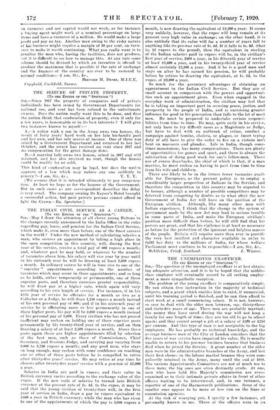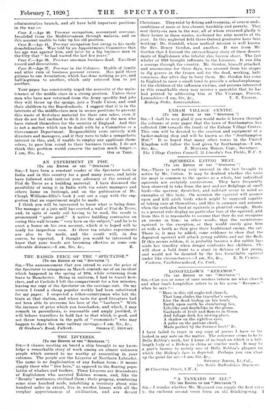THE UNEMPLOYED EX-OFFICER.
ITo THE EDITOR OF THE " SPECTATOR."] SIR,—The question of the unemployed ex-officer is at last obtain- ing adequate attention, and it is to be hoped that the middle- class employer will eventually accord to all seeking employ- • meat a more sympathetic reception.
The problem of the young ex-officer is comparatively simple. He can obtain free instruction in the majority of technical subjects, and a grant which enables him to exist, if unmarried, until his training period is finished, and he can then afford to start work at .a small commencing salary. It is not, however, so easy to deal with the older men between, say, thirty-three and forty-five years of age. These men are probably married; the money they have saved during the war will not keep a family for any lengths of time; they are too old to go to school again; and they cannot accept-a job at a salary of £200 or £250 per annum. And this type of man is not acceptable to the big employers. He has probably no technical knowledge, and the average business man of the City of London considers that the five years of war service have impaired his value. He is usually unable to return to his pro-war business because that business died when he joined the Service. A great number of the older men were in the administrative branches of the Army, and lost their first chance in the labour market because they were com- pulsorily retained in the Army, many until the end of 1919. The various Appointments Committees are not of much use to these men; the big ones are often -distinctly crude. At ene, men who have held His Majesty's commission are cross- examined as to their intimate private affairs in front of other officers waiting to be interviewed, and, in one instance, a reporter of one of the Harmsworth publications. Some of the smaller ones appear to be more or less run on the lines of commission agencies.
At the risk of wearying you, I specify a few instances, all personally known to me. Three of the officers were in an administrative branch, and all have held important positions in the war :- Case A.—Age 40. Pre-war occupation, accountant overseas. Invalided from the Mediterranean through malaria, and on this account unable to take up his old position.
Case B.—Age 41. Pre-war occupation lost owing to his tardy demobilization. Was told by an Appointments Committee that his age was against him, and later by a big business man in the City that " he had wasted the last five years."
Case C.—Age 38. Pre-war one-man business dead. Excellent record and decorations.
Case D.—Age 37. Pre-war in the Colonies. Health of family and utter ruin of business prevent return. Has paid three guineas to one Association, which has done nothing as yet, and half:a-guinea to another, which only referred him to yet another.
Your paper has consistently urged the necessity of the main- tenance of the middle class in a strong position. Unless these men who have now returned from the Army speedily find jobs they will throw up the sponge, join a Trade Union, and send their children to the Board-schools. I suggest that it is in the interests of the middle-class men in secure positions to prevent this waste of first-class material for their own sakes, even if they do not feel inclined to do it for the sake of the men who have ruined themselves for the security of England. And this is not a matter which can be dealt with by a Committee or a Government Department. Responsibility rests entirely with directors and managers, and if they were to take a sympathetic interest in this, and, if unable to employ any applicant them- selves, to pass him round to their business friends, I do not think this problem would concern the nation much longer.— I







































 Previous page
Previous page